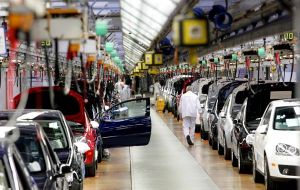MercoPress. South Atlantic News Agency
Argentine industrial activity drops 4.2% in April; auto industry hit by lower sales
 Auto manufacturing contracted 20%; inflation is estimated to reach 30% and higher interest rates punish consumers
Auto manufacturing contracted 20%; inflation is estimated to reach 30% and higher interest rates punish consumers After a decade of growth, the Argentine government faces this year a decline as industrial output falls and a high inflation rates hits consumer spending and new investment. The Argentine economy grew steadily recovering from a 2001-2003 debt crisis and expanded 3% last year but it stumbled in the fourth quarter and could slid into a recession at the start of this year.
Industrial activity dropped 4.2% in April compared to the same month last year, according to the government’s Indec stats office. The decline was largely due to a 20% fall in auto manufacturing as more than 15,000 workers have been suspended due to lower sales on the domestic market and fewer exports to Brazil, the main buyer of Argentina’s production.
A devaluation of the peso currency and a hike in interest rates in January weakened consumer spending, a pillar of the economy that had helped it withstand external shocks like the 2009 financial crisis.
The consensus view now is that the economy will shrink around one percent, the first full-year contraction since the debt crisis, when Argentina defaulted on 100 billion sovereign debt.
Output contracted 4.4% in 2001 and a stunning 10.9% the following year but since then has grown at an average of 6.2% a year.
The shift in policies in January was aimed at restoring the economy to better health in the medium term. But it’s causing pain now and critics say it may also fail because the government has not cut its own spending.
The 20% devaluation, the biggest in a decade, stoked inflation as people, who often think in dollars because they lack faith in their own currency, raised prices to adjust to the new exchange rate.
It also made the cost in pesos of imported goods and big-ticket items like houses that are sold in dollars jump. Opposition economists see inflation hitting at least 30% this year.
Salaries are not keeping up so real wages fell at one of the fastest clips since 2002 in the first quarter, think tank Ecolatina said.
Attempts to tame prices and shore up dollar reserves, such as a hike in interest rates and cut in energy subsidies, are also weighing on consumers.
“The measures have cooled consumption, which was the motor of economic growth for the last seven years,” Ecolatina said in a research note. “We do not expect consumption to grow in 2014.”




Top Comments
Disclaimer & comment rules-

-

-

Read all commentsA year ago (or maybe more) I said that Argentina was stealing future growth.
May 26th, 2014 - 08:44 am 0Now comes the time to pay for using up that growth.
If these are Indec Figures, then you have to believe that the actual figures are higher.
May 26th, 2014 - 09:29 am 0I remember so many conversations that I had with the likes of Think, Marcos, Toby, DanyB all of these really stupid K supporters that believed the propaganda.
May 26th, 2014 - 11:26 am 0“A new way, a heterodox economic model, it will never end, free market bad, communism good. blah blah blah.” Idiots all of them
I told them then all of this “growth” was based on stolen money and as soon as it runs out they were going to be screwed.
I was called every name they could think of.
Now if they are still on the site they avoid the economic articles. I guess they are embarrassed.
This is just the beginning of a very bad time, 2001 is going to look like the good ol' days.
The economy will grind to a halt, there will be mass layoffs, the only thing this gov't knows is how to pump $ into the system, which means another devaluation ( soon) then hyperinflation and no economic activity.
Look to Caracas.
Bread lines are coming to Argentina
Commenting for this story is now closed.
If you have a Facebook account, become a fan and comment on our Facebook Page!